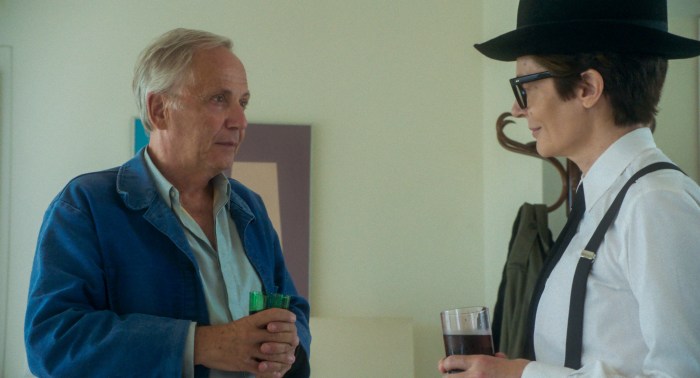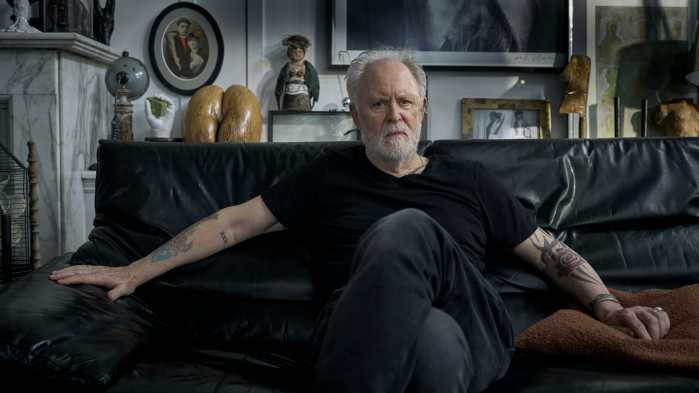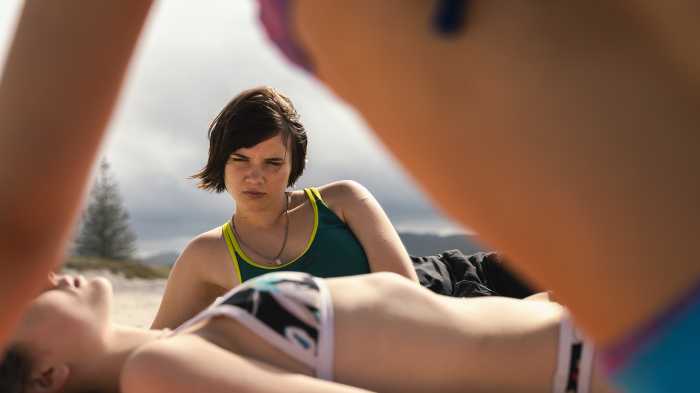There are two films by out gay writer/director Christophe Honoré screening at the IFC center this month. On January 24, there will be a new 4K remastered version of his provocative and controversial 2004 film, “Ma Mère.” This staggering erotic drama, loosely adaptated from George Bataille’s unfinished novel, depicts the incestuous relationship between a mother, Hélène (Isabelle Huppert) and her teenage son, Pierre (Louis Garrel).
Honoré’s charming new film, “Marcello Mio,” out Jan. 31, has his frequent collaborator, actress Chiara Mastroianni, adopting her late and famous father Marcello’s persona. When director Nicole García tells Chiara to be “more like her father,” she takes the message to heart and dons his hat, suit, hair (a wig) and his iconic glasses to pass as Marcello. The film chronicles her interactions with her real-life mother, Catherine Deneuve, her ex-husband Benjamin Biolay, fellow actors Fabrice Luchiní and Melvil Poupard, as well as a fictional character, Colin (out actor Hugh Skinner), a gay British soldier.
Honoré recently spoke with Gay City News about both films.
Looking back at “Ma Mère” 20 years later, what do you think of the film and its power?
“Ma Mère” is as if the film belongs to a life that is not mine anymore now. I find this younger filmmaker who made “Ma Mère” very brave. At the time, it was difficult to make films like “Ma Mère.” I was very serious. I came from literature; I was a writer and George Bataille was one of my favorite writers. I tried to see how Bataille could be filmed. I did it with rigor but with innocence, too. It was my second film [as director], so maybe I was too young. I never thought about the audience. I thought people would see this film, but afterwords, I realized it was very difficult for people to watch it in the theater. There are a lot of films with sexuality, nudity, and perversion, but the real difficulty with “Ma Mère” was the mixture between very literary themes and an almost documentary treatment in the staging.
You shoot “Ma Mère” with an intimacy featuring many closeups to scrutinize the characters faces, but you also use wide space to define the characters. Can you discuss the visual approach to the storytelling?
I remember the film reference was Pasolini, particularly “The Gospel According to St. Matthew.” There were a lot of close-ups in “Ma Mère,” but the camera was completely free. I never told my cinematographer, Hélène Louvart, what will happen on the set. It is important that the camera is always surprised. I would stand behind Hélène and touch her shoulder to indicate to move left or right or her neck to zoom. I like the chaotic movement.
Your film presents intense scenes of sadomasochism and incest. What is your goal in presenting such taboos?
Nowadays, incest has become a problem that society tries to confront. We are all aware of the calamities and tragedies it creates. Incest in Bataille, as in many literary works, is more evoked from a mythological point of view, or as a figure of absolute transgression. It is difficult today to take such a look at this scourge, to consider it in its age-old character. “Ma Mère” is a portrait of a very powerful mother. Sexuality is part of her power, but she is a dangerous woman, a femme fatale if you want, but that’s a little cliché. The film is about a kind of fight between a son and a mother, but a fight too, between a famous actress and a young actor.
“Ma Mère” and “Marcello Mio” both feature children who are fixated on their parents. What do you make of that connection?
It is a coincidence that that people in New York can see both films in the same afternoon and make some connections. In a way, “Marcello Mio” is more transgressive. It is a profanation of something sacred in cinema. Normally, actors play characters and not themselves. When they play themselves, it is usually a cameo, or as a joke, not the story. I asked Chiara and Catherine to play themselves and in situations when they talk about another real person, Marcello Mastroianni, who is dead. I know that is a dangerous frontier. But because the film is more comedic, with sweetness, and melancholic, but not with tears. Many people don’t see how bizarre the film is. It is very bizarre for Chiara Mastroianni to look like her father in a film and be with her own mother Catherine and go back to the apartment where they lived with Marcello. The story of cinema and memories are blended. I talked with Chiara and Catherine before shooting to make sure they were OK doing a comedy with this topic. For Chiara, it was heavy because people tell her she is “not a real person just the daughter of celebrities.” For her, it is an answer, and the only answer could be a fiction answer.

What decisions did you make about the episodes you include featuring Chiara as Marcello with the dog on television or recreating a famous scene from “La Dolce Vita?”
For me it was important that in the film there is no gossip or include things that we didn’t know beforehand. It is not a tabloid film. What was strange was that I write sequences and lines for Catherine, and she would ask her daughter, “Why did you tell that to Christophe? Those are memories.” And Chiara would reply, “I didn’t say anything!” Sometimes fiction and reality get crossed. It was strange for me and them.
In the end, the film is interesting to have “Ma Mère” in mind, because the real question of “Marcello Mio” is the relation between a daughter whose father died and how you can have a relation with your father’s ghost. Sometimes in life you talk more with your ghost than the people alive around you. Because it’s fiction and comedy, she can do what we can never dare to do in real life. To find her dad inside her. It’s a transformation movie, like a Marvel movie. She is a normal daughter, and suddenly with a hat and glasses, she becomes her dad. But even when she becomes her dad, she is very much a woman.
What prompted the inclusion of the film’s fictional character, Colin, the gay British soldier?
When I wrote the script, I needed someone who didn’t know Marcello or Catherine. I decided to have an Englishman because the English hate French cinema. And it was important to have the eventuality of romance between them. When she is a man, it is funny that she meets a gay man. For me, he was a little gift in the movie.
“Ma Mère” is about a woman who is very in control of her sexuality and her body. “Marcello Mio” expresses aspects of male privilege. What are your thoughts on how your films present issues of gender?
[Laughs.] I think “Marcello Mio” is a film about gender, but I hope it is not like “Emilia Pérez!” For gay filmmakers, the question of gender is already an old question. It’s very inside; it’s something you have in your own life, and it is very strange now to see all these films around the gender theme. Sometimes, it is very cultural. When Chiara becomes her dad, she becomes a man. Chiara realizes that to be a male actor is not the same as being a female actor. When she dreams about her dad, she dreams about the characters that are possible for male actors who are different and cooler than for female actresses. But in the same way, she is the daughter of Catherine who has played many interesting female characters. There is a fight in the film between Chiara and Melvil Poupaud. He is angry when he sees Chiara as Marcello and we are not sure if it is the game with Marcello or because she suddenly became a man. Likewise, Fabrice Luchini finds a good guy, a bon ami, with Chiara as Marcello. If she is a woman, she can’t be the good friend for Fabrice. He accepts Chiara as Marcello because it’s easier to feel a friendship for her as him. I hope that people see the subtleness of this in the film.
“Ma Mère” | Directed by Christophe Honoré | Opening January 24 at the IFC Center | Distributed by Kimstim
“Marcello Mio” | Directed by Christophe Honoré | Opening January 31 at the IFC Center | Distributed by Strand Releasing



































